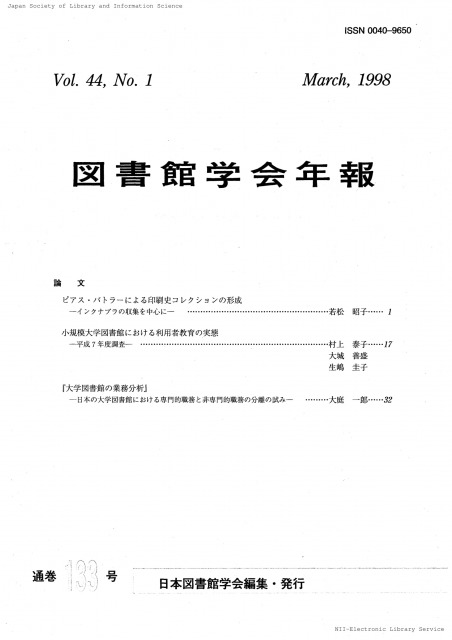All issues

Volume 42 (1996)
- Issue 4 Pages 181-
- Issue 3 Pages 135-
- Issue 2 Pages 87-
- Issue 1 Pages 1-
Volume 42, Issue 1
Displaying 1-7 of 7 articles from this issue
- |<
- <
- 1
- >
- >|
Article
-
Etsuko SHIMIZUArticle type: Article
1996 Volume 42 Issue 1 Pages 1-14
Published: 1996
Released on J-STAGE: November 10, 2021
JOURNAL FREE ACCESSThis paper presents a general view of the establishment and early activities of the Social Responsibility Round Table (SRRT) of the American Library Association (ALA). It also describes the role and impact of SRRT at the end of 1960s. A petition requesting the establishment of SRRT was presented in 1968, and it was approved by the Council of ALA in 1969.
The primary aim of SRRT was to make ALA in active on social problems. After 1970,when the Activities Committtee on New Directions for ALA (aCONDA) issued its final report,SRRT switched to attaching importance to more practical activities. Although its initial objective was not completely achieved,SRRT's activities publicized the idea that library services were to be linked up with social problems. This influenced the new services such as outreach and multicultural services that spread about in United States in the 1970s and 1980s.View full abstractDownload PDF (1611K) -
Madoko KONArticle type: Article
1996 Volume 42 Issue 1 Pages 15-31
Published: 1996
Released on J-STAGE: November 10, 2021
JOURNAL FREE ACCESSCivil Information and Education Section of General Headquarters of the Supreme Commander of the Allied Powers set up twenty three information centers [libraries] for the use of Japanese citizens as part of the occupation program. Each information center had numbers of deposits.
Results of this study: Of the first 17 information centers,there were 157 deposits included in this article. Many of the deposits were set up,taking over the reading rooms of Local Civil Affairs Teams dissolved. All the materials for the deposits were duplicate books and magazines of the centers. Deposits had their own feature according to the ideas of the directors of the centers. Japanese citizens learned about the inter-library loan system through the deposits and information centers.View full abstractDownload PDF (1947K) -
Hideki MINAIArticle type: Article
1996 Volume 42 Issue 1 Pages 32-48
Published: 1996
Released on J-STAGE: November 10, 2021
JOURNAL FREE ACCESSThe Code of Ethics for Librarians adopted by the Japan Library Association has been highly evaluated. However,it has been pointed out that the Code is not put into practice on a regular basis and that the Code is not instrumental in progressing the establishment of an employment system for librarians. This paper examines the characteristics and points at issue in the Code based on the Code and the related documents such as comments and reports by the Research Committee on the Problems of Librarians of the Japan Library Association. From the study,the followings were found.
The professionality of the librarians that is a premise to the Code is not totally elucidated. There is no adequate standards for service,job specifications,and education that prescribe the contents of the professionality. The Japan Library Association has no power to control its member. Therefore,the Code remains merely as an abstract idea in our country.
In addition,since the target of the Code has been expanded to all library staffs,the Code has not been able to fill the role of the goals for the librarians.
Accordingly,the Code has not been able to obtain the desired results as a step for the librarians to improve themselves. Itis necessary to establish the professinality of the librarians in the future to make the best of the Code.View full abstractDownload PDF (2128K)
-
Yoshio YANAGIArticle type: Article
1996 Volume 42 Issue 1 Pages 49-56
Published: 1996
Released on J-STAGE: November 10, 2021
JOURNAL FREE ACCESSI had a chance to learn about grants made by The British Library Research and Development Department in London and the Council on Library Resources in Washington in my studies designed to produce an institutional vision of supporting research and development in the field of library and information science in Japan.
In this article,I have tried to elucidate contributions of the two agencies to the librarianship and research communities,reviewing their histories,management process and some features of research areas which meet their standards of providing grants.
The results are below:
① leading experimental research activities through grants.
② aiding the development of a research community.
③ improvement and invention of library services,and their dissemination among libraries.
④ planning and implementation of various kinds of meeting for researchers and librarians.View full abstractDownload PDF (983K) -
Establishing of Hakodate MuseumRyuzo SAKAMOTOArticle type: Article
1996 Volume 42 Issue 1 Pages 57-62
Published: 1996
Released on J-STAGE: November 10, 2021
JOURNAL FREE ACCESSKenzo Okada (1883-1944),founder of the Hakodate City Library,began to manufacture candles in 1906. When he decided to use domestic raw materials,he found difficulty in finding literatures on them. This experience made him realize the need of the public library and begin to dedicate the rest of his life to it.
Actually,Kenzo Okada had another dream in his life: establishing of the Hakodate Museum. Surprisingly few people know this fact,but Okada thought that the library and the museum were inseparable.
In this study I would like to pursue a research into his vision of museum and his utterances for realizing it.View full abstractDownload PDF (692K)
-
1996 Volume 42 Issue 1 Pages 63-82
Published: 1996
Released on J-STAGE: November 10, 2021
JOURNAL FREE ACCESSDownload PDF (2254K) -
[in Japanese]1996 Volume 42 Issue 1 Pages 83-84
Published: 1996
Released on J-STAGE: November 10, 2021
JOURNAL FREE ACCESSDownload PDF (290K)
- |<
- <
- 1
- >
- >|